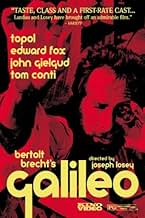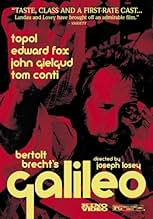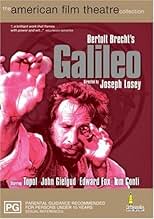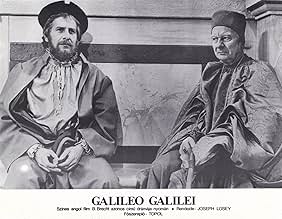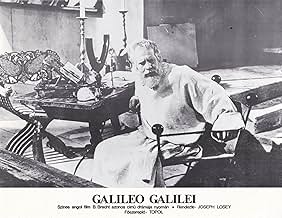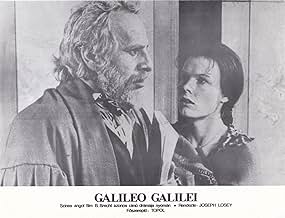Adicionar um enredo no seu idiomaGalileo Galilei, his telescopic discoveries, support of Copernican theory, conflict with Catholic Church leading to imprisonment, and influence on future scientists like Newton and Kepler.Galileo Galilei, his telescopic discoveries, support of Copernican theory, conflict with Catholic Church leading to imprisonment, and influence on future scientists like Newton and Kepler.Galileo Galilei, his telescopic discoveries, support of Copernican theory, conflict with Catholic Church leading to imprisonment, and influence on future scientists like Newton and Kepler.
- Direção
- Roteiristas
- Artistas
Avaliações em destaque
Have for a long time had a lot of respect for Bertolt Brecht and 'Life of Galileo' is one of his most interesting works, especially from a thematic standpoint. Galileo, his life and observations (ahead of the time in his day) were fascinating and he is still deserving of being a giant influential figure in science and modern physics. Joseph Losey did some very good films, including his work with Harold Pinter and his 'Don Giovanni'. The cast sounded perfect on paper.
They weren't completely on film though, due to the actor who sounded like the perfect choice for their role strangely not working. 'Galileo' is well worth watching and is one despite some big drawbacks one of the better films of the inconsistent American Film Theatre series. As well as one of the more interesting entries, again from a thematic and content standpoint. It is no masterpiece, but there are a lot of good things here in 'Galileo' executed greatly. If one doesn't know of Galileo or know a lot about him, this film has enough to make them intrigued more.
'Galileo' is made with an appealing visual style, with grander sets than the usual ones for the American Film Theatre films and the photography is expansive enough without being overblown. Visually and dramatically, of all the play to film adaptations of the series 'Galileo' is one of the least stagebound. Losey directs with restraint but with confidence, he seemed an odd choice for director on paper as this is different territory for him but he does very well. The script is intelligent without being wordy.
A script too that expertly shows what made Galileo so fascinating, what made his findings so important in the development of science and the challenges he had to face. The story is intelligently done and gutsy on the whole and as said it makes one want to know more about the man. The themes of the play are handled well with some genuine tension in the conflict, and actually it was not so bad a thing that the political elements weren't largely emphasised (they're far from absent though) in my view. The Pope and Inquisitor scene is hair raising. 'Galileo' does stray from the facts, but through no fault of the film as Brecht never intended the play to be a biopic. The cast on the whole are very good, with some expertly controlled and authoritative acting.
With one big exception, as much as it pains me to say it. Can understand completely the criticisms for Topol's Galileo and do agree. Will say right now that there have been criticised performances in film history that to me are nowhere near as bad as cited. There was another performance in the American Film Theatre series that got a good deal of criticism, Lee Marvin in 'The Iceman Cometh'. Actually found him very admirable in his role, and he was against type whereas Galileo sounded tailor made for Topol. Who has the physique but sadly neither the heft or the subtlety, he brought those in 'Fiddler on the Roof' so what happened.
It doesn't help though that the film also misses the point of the character in the play, he is written and portrayed as too sympathetic (or that's how it came across, and this was the case more than once in the play's performance history) whereas Brecht intended for him to be a condemnation. Furthermore, while understanding what their role in the film was meant to be, kind of a Greek chorus explaining events and motivations, the choir did feel out of place and interrupted the action rather than moved it on. A few scenes went on for too long and felt like padding.
Summing up, a few big problems but a lot of strengths. Pretty good and in the better half of the series. 7/10.
They weren't completely on film though, due to the actor who sounded like the perfect choice for their role strangely not working. 'Galileo' is well worth watching and is one despite some big drawbacks one of the better films of the inconsistent American Film Theatre series. As well as one of the more interesting entries, again from a thematic and content standpoint. It is no masterpiece, but there are a lot of good things here in 'Galileo' executed greatly. If one doesn't know of Galileo or know a lot about him, this film has enough to make them intrigued more.
'Galileo' is made with an appealing visual style, with grander sets than the usual ones for the American Film Theatre films and the photography is expansive enough without being overblown. Visually and dramatically, of all the play to film adaptations of the series 'Galileo' is one of the least stagebound. Losey directs with restraint but with confidence, he seemed an odd choice for director on paper as this is different territory for him but he does very well. The script is intelligent without being wordy.
A script too that expertly shows what made Galileo so fascinating, what made his findings so important in the development of science and the challenges he had to face. The story is intelligently done and gutsy on the whole and as said it makes one want to know more about the man. The themes of the play are handled well with some genuine tension in the conflict, and actually it was not so bad a thing that the political elements weren't largely emphasised (they're far from absent though) in my view. The Pope and Inquisitor scene is hair raising. 'Galileo' does stray from the facts, but through no fault of the film as Brecht never intended the play to be a biopic. The cast on the whole are very good, with some expertly controlled and authoritative acting.
With one big exception, as much as it pains me to say it. Can understand completely the criticisms for Topol's Galileo and do agree. Will say right now that there have been criticised performances in film history that to me are nowhere near as bad as cited. There was another performance in the American Film Theatre series that got a good deal of criticism, Lee Marvin in 'The Iceman Cometh'. Actually found him very admirable in his role, and he was against type whereas Galileo sounded tailor made for Topol. Who has the physique but sadly neither the heft or the subtlety, he brought those in 'Fiddler on the Roof' so what happened.
It doesn't help though that the film also misses the point of the character in the play, he is written and portrayed as too sympathetic (or that's how it came across, and this was the case more than once in the play's performance history) whereas Brecht intended for him to be a condemnation. Furthermore, while understanding what their role in the film was meant to be, kind of a Greek chorus explaining events and motivations, the choir did feel out of place and interrupted the action rather than moved it on. A few scenes went on for too long and felt like padding.
Summing up, a few big problems but a lot of strengths. Pretty good and in the better half of the series. 7/10.
Needless to day Galileo, look where we are now. I applaud your work and your dedication to the truth it has changed my future immensely. Sadly, the same can't be same for this film. If there was ever a film that you needed to use as a weapon of mass destruction against an unknown foe, Joseph Losey's Galileo would be my number one pick. By doing this you would ensure victory to your team by forcing your opponents to fall asleep. Galileo was the dullest piece of film I have ever encountered. From the acting to the irritating boys singing before every scene was just pure rubbish. This biography did nothing but uproot past High School science reports about this genius. It presented nothing new and nothing exciting. It was genetic cross between a classic British mini-series and one of those friends that never seems to get the hint that they are talking way too much. It was a disaster that would probably, in today's standards, put Galileo back into house arrest.
The role of Galileo was played an interesting actor by the name of Topol. New to this generation's work, I wasn't sure who Topol was until I watched this film. For those of you who do not know, he is a mix between an insane street urchin and a bearded John Belushi. His actions in this film seemed random and rabid at the same time. I never knew what he was going to do or say next, half due to the poor quality in sound, but also because Topol never looked scripted. I guess this is a good thing because it gave some realism to the scene, but it destroyed his character. I kept seeing Galileo as insane instead of brilliant. I know some will argue that Galileo was insane, but when I read about him I just couldn't picture him as one of those screwball geniuses. I always felt he was the real deal, just misunderstood. Topol's delivery of Galileo is longwinded in the sense that he talks more about his actions than just doing them. There seemed to be a lot of this going around in the film, but I will get into that later. Honestly, I wasn't impressed with Topol's performance in this film. I need to see him in more before I make my final decision on his acting ability, but Galileo was not his cup of tea. Outside of Topol, I didn't care about any of the other characters or really fully understand who they were. The lack of character development (odd in a three hour film) and poor sound (outside of the singing kids) only pulled me further away from the rest of the cast. They were just not up to quality standards.
While researching this film, I read by another reviewer about the reasoning for the American Film Theater to make this style of movie. In the mid 70s the organization released several of their plays to the silver screen for their members. As a chance to capture more people to their plays, they offered these subscriptions with six tickets to other films that they had released. The strange aspect about these movies is that they are not filmed as if the actors are on a stage, nor do they carry a lavish budget. They use some fancy (for the time) camera work to highlight some emotions in the characters, but that is it. The rest is cheap and claustrophobic scenery that would immediately turn the novice moviegoer away. Perhaps during this era this was considered amazing cinematography and set design, but in my eyes it just seems shoddy and poor. For this film to work well there needed to be less conversation, more involvement by other characters, and less singing. I didn't see this film labeled as a musical (and I understand why the kids sang to help guide the audience throughout the film as in a play), so I didn't need the twenty minute sexually driven dance sequence in the middle. It was as if it was put in there for the men in the audience that had patiently been waiting through this film (forcing their eyes to remain open) as an added benefit. Suddenly everyone was awake, just in time for the second act. GRRRRRRR.
Overall, this film put me to sleep several times before it was over. It was not the biography I was hoping for on this acclaimed scientist. As a period piece film it failed and as a 'courtroom drama' it failed as well. The actors seemed like they were overacting for film because they were used to the theater productions. Infants did the camera work and the singing kids who introduced the scenes should have been put out of their misery. At least wait till someone has hit puberty to get them singing! Jeesh. If the American Theater wanted this to attract others to their productions, they should have filmed it on a stage, it would have created a better atmosphere and tone. Topol, I hope to see you in better down the road, but until then, stay far away from science.
Grade: * out of *****
The role of Galileo was played an interesting actor by the name of Topol. New to this generation's work, I wasn't sure who Topol was until I watched this film. For those of you who do not know, he is a mix between an insane street urchin and a bearded John Belushi. His actions in this film seemed random and rabid at the same time. I never knew what he was going to do or say next, half due to the poor quality in sound, but also because Topol never looked scripted. I guess this is a good thing because it gave some realism to the scene, but it destroyed his character. I kept seeing Galileo as insane instead of brilliant. I know some will argue that Galileo was insane, but when I read about him I just couldn't picture him as one of those screwball geniuses. I always felt he was the real deal, just misunderstood. Topol's delivery of Galileo is longwinded in the sense that he talks more about his actions than just doing them. There seemed to be a lot of this going around in the film, but I will get into that later. Honestly, I wasn't impressed with Topol's performance in this film. I need to see him in more before I make my final decision on his acting ability, but Galileo was not his cup of tea. Outside of Topol, I didn't care about any of the other characters or really fully understand who they were. The lack of character development (odd in a three hour film) and poor sound (outside of the singing kids) only pulled me further away from the rest of the cast. They were just not up to quality standards.
While researching this film, I read by another reviewer about the reasoning for the American Film Theater to make this style of movie. In the mid 70s the organization released several of their plays to the silver screen for their members. As a chance to capture more people to their plays, they offered these subscriptions with six tickets to other films that they had released. The strange aspect about these movies is that they are not filmed as if the actors are on a stage, nor do they carry a lavish budget. They use some fancy (for the time) camera work to highlight some emotions in the characters, but that is it. The rest is cheap and claustrophobic scenery that would immediately turn the novice moviegoer away. Perhaps during this era this was considered amazing cinematography and set design, but in my eyes it just seems shoddy and poor. For this film to work well there needed to be less conversation, more involvement by other characters, and less singing. I didn't see this film labeled as a musical (and I understand why the kids sang to help guide the audience throughout the film as in a play), so I didn't need the twenty minute sexually driven dance sequence in the middle. It was as if it was put in there for the men in the audience that had patiently been waiting through this film (forcing their eyes to remain open) as an added benefit. Suddenly everyone was awake, just in time for the second act. GRRRRRRR.
Overall, this film put me to sleep several times before it was over. It was not the biography I was hoping for on this acclaimed scientist. As a period piece film it failed and as a 'courtroom drama' it failed as well. The actors seemed like they were overacting for film because they were used to the theater productions. Infants did the camera work and the singing kids who introduced the scenes should have been put out of their misery. At least wait till someone has hit puberty to get them singing! Jeesh. If the American Theater wanted this to attract others to their productions, they should have filmed it on a stage, it would have created a better atmosphere and tone. Topol, I hope to see you in better down the road, but until then, stay far away from science.
Grade: * out of *****
10pholmer
The movie of Bertolt Brecht's play "Galileo" was made in 1975, starring Topol, with John Gielgud and Clive Revill among others. The goal in making this movie (and all AFT films) was to take a theatrical experience and turn it into a cinematic experience without changing the content to do so. Criticisms that this film didn't do enough to expose the excesses of the Inquisition or that Topol's depiction of Galileo was too abrasive miss the point. This play is about the role and responsibility of the scientist in society. Written during the time that atomic bombs were being created, it criticizes scientists who fail to bring the truth to the people because they fear the retaliation of the authorities.
Galileo is portrayed as an opportunistic genius who is not above stealing someone else's invention and claiming it as his own if it will profit him. He is self-indulgent and corrupt, but he is still a scientist. When his theories of the nature of the universe conflict with the Church's, he recognizes that this may upset not only the way people view the sky, but their own own position in the constellation of their society. Galileo hopes to profit from this, to become a new high priest of science. But when threatened with torture by the Inquisition, a threat the Inquisitors know they dare not carry out because of Galileo's popularity, Galileo capitulates out of the fear of physical pain. His work is confiscated by the Church to be locked away from the people, his recantation is published and the incipient revolution he inspired dies away. Galileo is granted a small pension and forbidden to do any real scientific work.
Years later, Galileo is visited by a former assistant who tells him of the chilling effect his recantation had on scientific progress everywhere in Europe, that no one dares to express any dissident viewpoints. Galileo removes a copy of his scientific treatises from a hiding place and gives it to the assistant to smuggle out of the country. Galileo tells him he has spent many years secretly reconstructing his findings, waiting for someone to give them to. The assistant's tone instantly changes and he lauds Galileo for surviving the Inquisition so his work would not be lost. But Galileo refuses to accept these congratulations and condemns his recanting of the truths he had discovered. He says he knows now that he was never truly in danger and that his personal cowardice led to the continuation of oppressions of all kinds in society as well as the corruption of scientific discovery. He wonders what he and others scientists might have accomplished for the good of all if only he had stood up for the truth when he had the chance to do so. As the assistant leaves with the treatises, Galileo cautions him not to tell anyone where he got them. Galileo still fears reprisals from the powers that be and the loss of his minimal comforts. "...Your cheering at some new achievement would be echoed by a universal howl of horror," Galileo tells his former assistant. "I have betrayed my profession. Any man who does what I have done must not be tolerated in the ranks of science." This all supports playwright Brecht's leftist views, of course, but also accurately reflects the ambivalence of many of the A-bomb scientists about their creation.
"Galileo" was made by the American Film Theatre, the brainchild of producer Ely Landau. The AFT films were shown only in selected movie theaters to audiences who paid a subscription fee for a series of 6 plays on film a year. The AFT series ran from 1973 to 1976. These films were not simply filmed stage productions, nor were they "Hollywoodized" to increase viewers. They used the text of the plays as written by their authors. However, they also used cinematic techniques (close-ups, pans, dolly shots, etc.) to focus the audience's attention on important characters' expressions, reactions and interactions with other characters.
Other plays in this series include "The Man in the Glass Booth", for which Maximilian Schell received a Best Actor Academy Award Nomination, Jean Genet's "The Maids" with Susanna York and Glenda Jackson (I think) an
Galileo is portrayed as an opportunistic genius who is not above stealing someone else's invention and claiming it as his own if it will profit him. He is self-indulgent and corrupt, but he is still a scientist. When his theories of the nature of the universe conflict with the Church's, he recognizes that this may upset not only the way people view the sky, but their own own position in the constellation of their society. Galileo hopes to profit from this, to become a new high priest of science. But when threatened with torture by the Inquisition, a threat the Inquisitors know they dare not carry out because of Galileo's popularity, Galileo capitulates out of the fear of physical pain. His work is confiscated by the Church to be locked away from the people, his recantation is published and the incipient revolution he inspired dies away. Galileo is granted a small pension and forbidden to do any real scientific work.
Years later, Galileo is visited by a former assistant who tells him of the chilling effect his recantation had on scientific progress everywhere in Europe, that no one dares to express any dissident viewpoints. Galileo removes a copy of his scientific treatises from a hiding place and gives it to the assistant to smuggle out of the country. Galileo tells him he has spent many years secretly reconstructing his findings, waiting for someone to give them to. The assistant's tone instantly changes and he lauds Galileo for surviving the Inquisition so his work would not be lost. But Galileo refuses to accept these congratulations and condemns his recanting of the truths he had discovered. He says he knows now that he was never truly in danger and that his personal cowardice led to the continuation of oppressions of all kinds in society as well as the corruption of scientific discovery. He wonders what he and others scientists might have accomplished for the good of all if only he had stood up for the truth when he had the chance to do so. As the assistant leaves with the treatises, Galileo cautions him not to tell anyone where he got them. Galileo still fears reprisals from the powers that be and the loss of his minimal comforts. "...Your cheering at some new achievement would be echoed by a universal howl of horror," Galileo tells his former assistant. "I have betrayed my profession. Any man who does what I have done must not be tolerated in the ranks of science." This all supports playwright Brecht's leftist views, of course, but also accurately reflects the ambivalence of many of the A-bomb scientists about their creation.
"Galileo" was made by the American Film Theatre, the brainchild of producer Ely Landau. The AFT films were shown only in selected movie theaters to audiences who paid a subscription fee for a series of 6 plays on film a year. The AFT series ran from 1973 to 1976. These films were not simply filmed stage productions, nor were they "Hollywoodized" to increase viewers. They used the text of the plays as written by their authors. However, they also used cinematic techniques (close-ups, pans, dolly shots, etc.) to focus the audience's attention on important characters' expressions, reactions and interactions with other characters.
Other plays in this series include "The Man in the Glass Booth", for which Maximilian Schell received a Best Actor Academy Award Nomination, Jean Genet's "The Maids" with Susanna York and Glenda Jackson (I think) an
This fine work by Berthold Brecht and directed by Joseph Losey is brought to us
by about a 20 year delay period. That was because of the House Un-American
Activities Committee and the blacklisting of both.
Brecht kind of, sort of made his case for HUAC as he went back to East Germany where he was acclaimed a cultural icon. Joe Losey took off for Great Britain where he worked for the most part until his death.
You can see why the mossbacks of HUAC thought Galileo by Brecht was highly subversive stuff. Question church authority and by implication the state because religion was established. No more so than in Italy and its many Catholic city/states.
Galileo Galilei scientist/engineer was a popular well respected fellow who got a hold of a spyglass invented by the Dutchman Hans Lippershey and saw the possibilities for it in astronomy. Already a believer in the theory advanced by Copernicus about the sun being a center of the universe. The telescope allowed Galileo to observe and make more findings. If the Earth is the center of things than what are those bodies orbiting Jupiter for instance?
The Roman Catholic now engaged in a counter attack against all that Protestant type heresy took a dim view of this stuff. Galileo got vigorously questioned for these theories.
Israeli actor Topol plays the bluff and hearty Galileo. He's a man used to his creature comforts and not built for martyrdom as is shown in the play.
The fine cast Losey assembles includes Clive Revill and Georgia Brown as cabaret singers, Michael Lonsdale as Pope Urban, and Edward Fox as the Cardinal Inquisitor. John Gielgud has a great cameo as a cardinal who is beside himself with indignation that anyone would question the workings of the universe, their universe.
Galileo's epitaph despite his failure to martyr himself is the best of all. No amount of proclamations from the state or the pulpit will change the way the universe works.
That IS subversive stuff.
Brecht kind of, sort of made his case for HUAC as he went back to East Germany where he was acclaimed a cultural icon. Joe Losey took off for Great Britain where he worked for the most part until his death.
You can see why the mossbacks of HUAC thought Galileo by Brecht was highly subversive stuff. Question church authority and by implication the state because religion was established. No more so than in Italy and its many Catholic city/states.
Galileo Galilei scientist/engineer was a popular well respected fellow who got a hold of a spyglass invented by the Dutchman Hans Lippershey and saw the possibilities for it in astronomy. Already a believer in the theory advanced by Copernicus about the sun being a center of the universe. The telescope allowed Galileo to observe and make more findings. If the Earth is the center of things than what are those bodies orbiting Jupiter for instance?
The Roman Catholic now engaged in a counter attack against all that Protestant type heresy took a dim view of this stuff. Galileo got vigorously questioned for these theories.
Israeli actor Topol plays the bluff and hearty Galileo. He's a man used to his creature comforts and not built for martyrdom as is shown in the play.
The fine cast Losey assembles includes Clive Revill and Georgia Brown as cabaret singers, Michael Lonsdale as Pope Urban, and Edward Fox as the Cardinal Inquisitor. John Gielgud has a great cameo as a cardinal who is beside himself with indignation that anyone would question the workings of the universe, their universe.
Galileo's epitaph despite his failure to martyr himself is the best of all. No amount of proclamations from the state or the pulpit will change the way the universe works.
That IS subversive stuff.
Galileo wheedles, cajoles, and instructs in this filmed stage version of Bertold Brecht's play, as translated by Charles Laughton.
Director Joseph Losey had directed its Broadway debut eight years earlier, and it's offered as a stage show, albeit with cinematographer Michael Rand offering a variety of angles and editor Reginald Beck trying his hardest.
It's one of those shows that is a hagiography, as Topol ages and looks weary, but maintains his childlike wonder. It's got some stage luminaries giving restrained performances -- except for John Gielgud as an elderly, ranting cardinal. The great charm of this production is, of course, seeing these fine stage actors in their natural medium. With Edward Fox, Margaret Leighton, Clive Revill and Tom Conti.
Director Joseph Losey had directed its Broadway debut eight years earlier, and it's offered as a stage show, albeit with cinematographer Michael Rand offering a variety of angles and editor Reginald Beck trying his hardest.
It's one of those shows that is a hagiography, as Topol ages and looks weary, but maintains his childlike wonder. It's got some stage luminaries giving restrained performances -- except for John Gielgud as an elderly, ranting cardinal. The great charm of this production is, of course, seeing these fine stage actors in their natural medium. With Edward Fox, Margaret Leighton, Clive Revill and Tom Conti.
Você sabia?
- CuriosidadesJoseph Losey had also directed the original Broadway production of "Galileo," 28 years previously.
- Erros de gravaçãoAfter the crier announces Galileo Galilei's recantation, a chessboard is seen on the left side of the screen: all the pieces are upright. As Galileo enters, a new shot shows that one of the pieces has been toppled. In the next shot, all the pieces are again upright (1:57:50-1:58:10).
- Citações
Andrea Sarti: [upon Galileo's recantation] Unhappy is the land that has no heroes.
Galileo Galilei: Incorrect. Unhappy is the land that *needs* a hero.
- ConexõesFeatured in Zomergasten: Episode #23.1 (2010)
Principais escolhas
Faça login para avaliar e ver a lista de recomendações personalizadas
- How long is Galileo?Fornecido pela Alexa
Detalhes
- Tempo de duração
- 2 h 25 min(145 min)
- Mixagem de som
- Proporção
- 1.85 : 1
Contribua para esta página
Sugerir uma alteração ou adicionar conteúdo ausente


